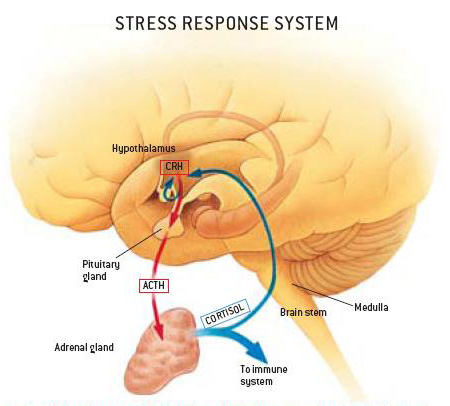
You wake up everyday ridiculously early, brush your teeth half asleep, and rush to get ready in 20 minutes – just to catch the bus downtown. This is a morning routine many people aren’t too fond of. Commuting may it be taking the TTC in Toronto, Translink in Vancouver or driving your beater on the Trans-Canada Highway isn’t something we look forward to.
Now I don’t know about you, but I’ve always wondered why I found it so unbearable? Studies show commuting has a biological effect on our mind and body that causes these negative associations, mainly through stress.
I’m not going to nag you (like your mother or wife) about all the health risks associated with commuting, rather let’s find out what is happening to our brains when we’re commuting and why it makes us feel so shitty.
The Brain’s Response System During the Commute
 Let’s say that you’re taking the highway to work and you’re bumper-to-bumper jammed in traffic. Look to your watch and you can just tell you’ll be late to work. You start to feel anxious and frustrated at the same time. Your body starts to go into “flight-or-fight” mode and this is happening because your body is reacting to the chain of (small) frustrating events. Mainly being stuck and wanting to urgently move faster, not because you’re in any actual danger.
Let’s say that you’re taking the highway to work and you’re bumper-to-bumper jammed in traffic. Look to your watch and you can just tell you’ll be late to work. You start to feel anxious and frustrated at the same time. Your body starts to go into “flight-or-fight” mode and this is happening because your body is reacting to the chain of (small) frustrating events. Mainly being stuck and wanting to urgently move faster, not because you’re in any actual danger.
At this point in the car your brain shoots nerve signals down your spinal cord to your adrenal glands (near the kidneys) telling them to release the first stress hormone: adrenaline. At the same time, you’re also receiving signals from your brain telling it to produce another stress hormone called cortisol.
Now as you’re sitting in your car on the DVP your blood sugar levels slowly rise, blood pressure and heart rate dramatically increase. Although you didn’t grab your Tim Horton’s on the way to work you feel fully awake and alert – this is the stress at work.
This stress response isn’t all bad. The misconception is that all stress is bad. We have many stress inducing hormones that are helpful to our learning and formation of memory. The negative form of stress occurs when we are frequently stressed our adrenal glands secrete stress hormones at a faster rate and chronic stress is produced.
This is where things start to get ugly.
Death by Commute
 Things turn ugly when you are consistently faced with stress and commuters are at a higher risk of this chronic stress. Studies have proven that exposing yourself to weeks, months or even years of repetitive stress can not only affect your body’s health, but also your brain.
Things turn ugly when you are consistently faced with stress and commuters are at a higher risk of this chronic stress. Studies have proven that exposing yourself to weeks, months or even years of repetitive stress can not only affect your body’s health, but also your brain.
The most shocking effect to the brain is that chronic stress can impair the number of brain cells in your memory. The overdose of cortisol being released when you’re stressed damages the part of your brain associated with your memory (hippocampus). Your neurons in your brain are being overloaded too frequently and literally are excited to death when faced with too much stress.
The unpleasant pressure from chronic stress goes beyond losing a few memory brain cells and goes as far as shortening your life span.
How to Minimize Stress for Your Next Commute
 The fact is that “stress by commute” will likely remain the same most of your life. It’s very difficult to make the choice to move closer to work just to avoid these long-term effects of chronic stress. However, you can make the commute better to reduce the amount of stress you face on a day to day basis by trying some of these tricks:
The fact is that “stress by commute” will likely remain the same most of your life. It’s very difficult to make the choice to move closer to work just to avoid these long-term effects of chronic stress. However, you can make the commute better to reduce the amount of stress you face on a day to day basis by trying some of these tricks:
- Listen to Mozart to decrease anxiety
- Try different routes to work to switch things up
- Switch between public transit (even though it sucks) every now and then so you can increase your body movement
- Leave earlier for work to avoid traffic jams
If you have any other tips to reduce stress on the way to work be sure to share in the comments below:






